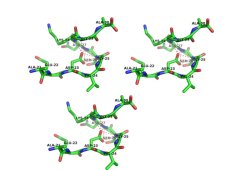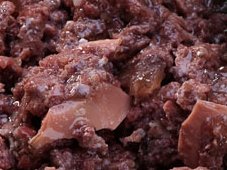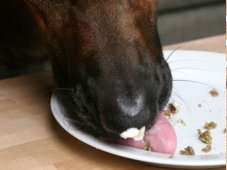Why All Proteins Aren’t the Same

As Dr. Joyce and her colleagues set out to put meat back on the beagle’s bones, it was protein that played a major part in returning the pooch to its fighting weight. Below, Dr. Joyce weighs in on the importance of protein and what kinds your dog needs to stay healthy.
Why Protein?
Dogs evolved from wolves in the wild, surviving primarily on a diet of other animals. Their digestive systems learned to utilize meat, fat and bones. This diet provided them with amino acids, the building blocks of protein they needed and could only get from animal food sources. They came to rely on these amino acids to build, maintain and repair their bodies – from skin to muscle tissue. But not just any protein will do. "Like humans, dogs need a variety of amino acids, and not all proteins contain them,” says Dr. Joyce.
Animal vs. Plant Protein
Dogs are omnivorous, meaning they are able to make use of the nutrients in both plant and animal sources. However, plant protein alone does not supply the amino acid balances they need to thrive. "For dogs,” says Dr. Joyce, "vegetable protein is definitely inferior to animal protein.”
While protein in commercial dog foods comes from both meat and plant sources, the most nutritious dog food will have a high-quality animal protein listed as one of its first (if not the first) ingredient. "Higher-quality animal protein is more easily used by the body,” explains Dr. Joyce.
Types of High-quality Protein
Meats and meat byproducts provide high-quality protein for dogs. Byproducts – which include blood, internal organs and bones – might not sound appetizing to a human palate but were a necessity for canines in the wild. Before becoming companion animals to humans who fed them promptly and nutritiously every morning, these dogs could not afford to leave any part of their prey uneaten. Their bodies came to rely on the whole animal as a nutrition source.
How to Identify a High-quality Protein Food
This will only take a minute but may require that you put on your reading glasses. As mentioned above, the first ingredient listed on your furry friend’s food bag should be a specifically identified high-quality protein source. "The label should specify which animal the protein comes from – for example, chicken or beef,” says Dr. Joyce. So any variation on, say, chicken is acceptable (for example, chicken meal or chicken byproduct meal).
Protein Dos and Don’ts
- Do feed your normal-weight dog a commercial food that contains high-quality protein like chicken, chicken meal or chicken byproduct meal.
- Do consult your veterinarian about the special dietary needs of your pet at all life stages.
- Don’t feed your dog table scraps. Your pet’s protein needs should be satisfied during mealtime. Any extras may lead to stomach problems and weight gain.
- Don’t give your dog protein supplements (unless your veterinarian recommends them).
With a diet rich in high-quality protein, your dog will maintain muscle mass as it ages and be more likely to experience long-term health and well-being – just like Dr. Joyce’s once anorexic beagle. Dr. Joyce reports that it is now living in Florida, fat and happy with its lucky new family.













